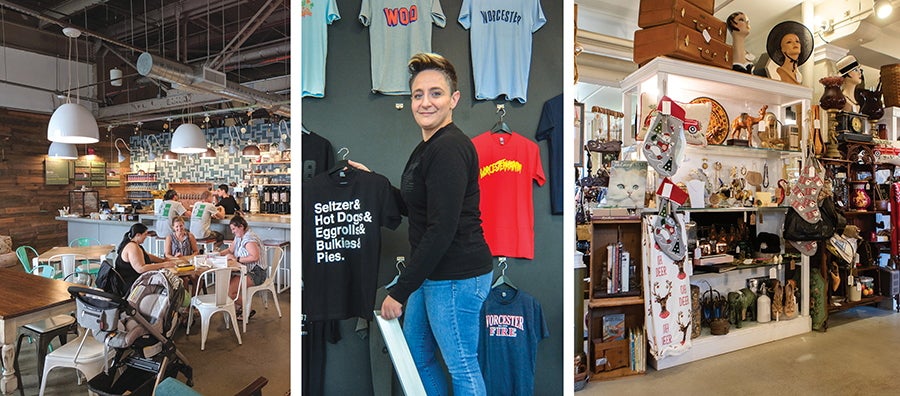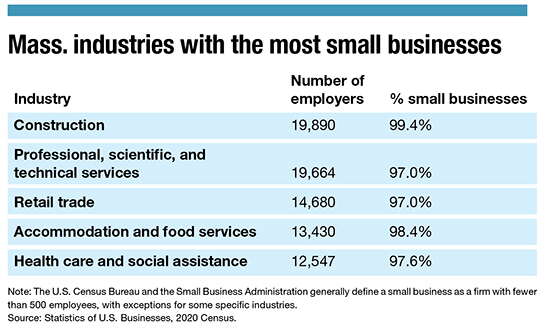
Act now, before it’s too late: Worcester small business owners are ringing alarm bells over high costs and lower consumer spending
 Photo | WBJ File
Owners of high-profile Worcester small businesses including (from left) Redemption Rock Brewing, Worcester Wares (pictured is owner Jessica Walsh), and Crompton Collective are saying consumer support is not what it once was.
Photo | WBJ File
Owners of high-profile Worcester small businesses including (from left) Redemption Rock Brewing, Worcester Wares (pictured is owner Jessica Walsh), and Crompton Collective are saying consumer support is not what it once was.
While corporate profits have surged to near record levels, according to the U.S. Bureau of Economics Analysis statistics released in late November, operators of prominent small businesses in Worcester have not seen the same growth.
In fact, it’s quite the opposite, as a perfect storm of rising costs and lower consumer spending have owners deeply concerned about the future of the local small business community.
Despite hesitance to break the facade of positivity and pleasantness required to operate a locally owned business, they are beginning to sound the alarm bells over concerns the current economic climate could lead to the eventual disappearance of some of Worcester’s small business staples.
Small businesses sound off
Higher costs. Stingy customers. Event fatigue.
In a meeting ahead of November’s Small Business Saturday, these were just some of the frustrations owners expressed at the No Jerks Small Business Summit, a forum held at Redemption Rock Brewing in Worcester. The intent of the summit was to provide owners a chance to vent and find solutions to the seemingly endless list of challenges that emerged during the coronavirus pandemic.
The main message from attendees was a simple one: If residents and city officials are as proud of Worcester’s small businesses as they claim, they should consider doing more on a day-to-day basis to support them.
“It feels like everyone is just heads down, trying to survive,” said Dani Babineau, CEO and co-founder of Redemption Rock and co-organizer of the event, regarding her conversations with other small business owners. “There are a lot of people I know that are in really bad shape.”

The idea for this No Jerks event started when Amy Chase, owner of the Crompton Collective and Haberdash retail stores in the Canal District, made a social media post about a store on Cape Cod going out of business, Babineau said. The store’s closure prompted comments from customers who said they loved the business and were sad to see it closing, despite the fact many of those same commenters admitted they hadn’t been to the store in months.
Babineau agreed with Chase’s sentiment this flood of after-the-fact appreciation was disappointing, saying it showed a lack of understanding from the general public of how they have to frequently shop at local businesses if they want to see them survive.
“The public in general doesn’t necessarily see [businesses struggling] from the outside,” Babineau said. “We’re essentially selling fun, we’re selling positivity, so you can’t let the veneer down.”
Business owners are feeling the squeeze from the rising costs of services and raw materials, a factor made all the more difficult by consumers tightening their belts.
“When you raise your price by a dollar and someone comes in and says, ‘Oh my god, this is $17,’ it takes everything in me not to say, ‘It should be $25,’” said Jessica Walsh, owner of Worcester Wares, a gift shop on Commercial Street selling locally made souvenirs and clothing.
Attendees agreed the dramatic changes in consumer habits have forced businesses to throw out their pre-pandemic playbooks.
“Everything leading up to the pandemic was great. You had your data, and you could use it to make predictions,” said Sean Woods, owner of Sundown Bar in the Canal District and co-owner of the deadhorse hill restaurant on Main Street. “Then it was like we started over. I have no idea what makes people leave the house anymore.”
Hosting events has been the only way to consistently draw crowds to their businesses, the attendees at the No Jerks meeting said.
“We lean hard into events to try to get people out here. If you look at our calendar, I think we have events every day,” said Babineau. “Basically nobody goes out anymore if they don’t have an event to go to.”
However, the constant planning of events can be a drain on staff leading to diminishing returns.

Searching for solutions
While the mood in the room was somber, the conversation eventually shifted to focusing on finding solutions. Small business struggles are not just limited to Worcester, but attendees were hopeful the community can rise to meet these challenges.
One proposed solution included exploring the creation of a Worcester small business alliance, as some in attendance felt the Worcester Regional Chamber of Commerce focuses more on representing larger companies.
Other ideas included supporting efforts to make public transportation more widely available in the region, fostering the creation of more food trucks to help draw attendees to events, and encouraging more collaboration and cross-promotion between small businesses.

The City of Worcester government needs to take more concrete actions to help struggling small businesses, said Travis Duda, co-organizer of the No Jerks event and owner of Hunchback Graphics in Worcester.
“If we’re going to talk about small businesses and be bummed when they can’t continue, we need to do more now to spend money and shout from the rooftops to support them,” Duda said.
Holidays may not bring relief
The holidays can be a make-or-break period for small businesses, but unless consumer habits suddenly change, there’s reason to believe this year’s shopping season may not provide the relief.
Speaking with WBJ via email a week after the summit, Chase of Crompton Collective said her Small Business Saturday sales were down 17% from last year, where sales were already down 13% from 2021.
“People are not coming out on Small Business Saturday like they used to,” she wrote.

The rest of 2023 may not bring the relief small grocery stores, boutiques, and breweries are looking for, as a November press release from the Retailer’s Association of Massachusetts predicted relatively flat holiday sales.
The association foresees a 1% increase in local holiday shopping compared to 2022, lower than the 3-4% U.S. increase for all business types and sizes predicted by the National Retail Federation.
“We are asking Massachusetts’ holiday shoppers to remember that how they invest their dollars makes a big difference for the local economy,'' RAM President Jon Hurst said in the release. “It’s more important than ever that we all work harder to protect, promote, and preserve our main streets and our important local shopping districts. We have enjoyed them for hundreds of years in New England, and we need to make sure they exist for generations to come.”
RAM’s holiday survey of its members echoed the challenges Worcester businesses owners at the No Jerks event said they are struggling to overcome: Continued inflation, declining profitability, lower consumer confidence, and higher interest rates.
Trends simply haven’t returned to pre-COVID norms, Chase said.
“The customer foot traffic seems to be down in all our locations this year, and small businesses all over America that I follow are reporting the same,” she wrote. “COVID put everyone in the habit of online shopping and ordering in, and those habits have stuck.”
House of cards
Lynn Cheney, owner of the curated grocery store Maker to Main on Harding Street was too tied down with the pre-Thanksgiving turkey rush to attend the No Jerks event, but she had many of the same thoughts as those who were present, saying consumers’ own financial hardships are creating an environment where supporting local businesses just isn’t on their radars.

“Rent increases, food prices, utilities, these are all things that create more financial stress on all of us. The last thing that most consumers are considering right now is how they are going to support small businesses,” she said.
Cheney originally opened Maker to Main on Main Street in Worcester in February 2020, but she closed that location in March 2023, as she wasn’t seeing the foot traffic necessary to effectively operate. The Harding Street location opened in September.
While everyone wants to put on a cheery face for the holidays, nobody can escape the current reality.
“Except for small business owners talking to each other, nobody is really talking about these problems,” Cheney said, expressing concerns businesses are going to start to falter. “It’s a house of cards right now.”
Cheney isn’t the only one concerned about closures.
“A lot of Worcester is known for its small businesses. They make this city unique.” wrote Chase. “I hope people learn that if they want to keep them here, they have to make the extra effort to go to those businesses, before they are gone.”














0 Comments